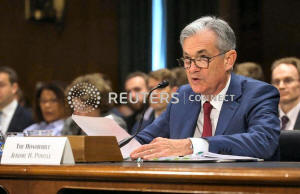Fed's Powell affirms rate cut view; others see U.S. economy humming
 Send a link to a friend
Send a link to a friend
 [July 12, 2019]
By Howard Schneider and Ann Saphir [July 12, 2019]
By Howard Schneider and Ann Saphir
ATLANTA/VICTOR, Idaho (Reuters) - As
Federal Reserve Chair Jerome Powell kept the focus Thursday on global
risks that could trigger a Fed rate cut in coming weeks, his colleagues
from regional Fed districts painted a rosier picture of continued U.S.
economic growth and a solid business outlook.
The contrasting remarks show the dilemma the Fed faces as it heads
toward an end-of-month monetary policy meeting now broadly expected to
end with a rate reduction.
On one hand - emphasized by Powell in Congressional hearings Wednesday
and Thursday and seconded by the influential chief of the New York Fed
and Fed Governor Lael Brainard -- global trade and economic risks have
put a dent in investment, inflation is well below the Fed's 2% target,
and the U.S. expansion may need a shot in the arm.
But as they polled businesses in their districts, Atlanta Federal
Reserve Bank President Raphael Bostic and Richmond Federal Reserve Bank
President Thomas Barkin saw an economy still humming, and no clear need
for the Fed to ease monetary policy.

"I am not seeing the storm clouds actually generate a storm yet," said
Bostic, who described himself as skeptical of the need to cut interest
rates right now. "With very few exceptions businesses are telling me the
economy is performing as strong as it was. They are not seeing
weaknesses in consumer engagement. And they are not materially changing
their plans."
"I've been out in the last couple weeks and I'm talking to business
people," Barkin said on Thursday. "They are not yet leaning back...They
are not cutting jobs, They are not cutting investments that have already
been underway. But they are cautious...They haven't stopped, they've
just slowed."
More detail about on-the-ground business sentiment may come next week
when the Fed releases its latest Beige Book compendium of anecdotal
information from the 12 Fed districts.
Powell has pointed to a number of national surveys as evidence business
confidence took a hit recently, particularly in May after President
Donald Trump threatened to impose tariffs on Mexican imports unless his
demands about tougher immigration enforcement were met.
The tariffs were not levied, but "it was a bit of a confidence shock,
Powell told the Senate Banking Committee.
In Albany, New York Thursday, New York Fed President John Williams,
added his voice in support of a rate cut, citing uncertainties around
trade and global growth and soft inflation. "The arguments, for adding
policy accommodation have strengthened over time."
Brainard, in a separate appearance in Scranton, Pennsylvania, piled on.
"Taking into account the downside risks at a time when inflation is on
the soft side would argue for softening the expected path of monetary
policy according to basic principles of risk management," she told a
community banking group.
[to top of second column]
|

Federal Reserve Board Chairman Jerome Powell testifies before a
Senate Banking, Housing and Urban Affairs Committee hearing on the
"Semiannual Monetary Policy Report to Congress" on Capitol Hill in
Washington DC, U.S., July 11, 2019. REUTERS/Leah Millis

Neither Barkin nor Bostic have a vote this year on the Fed's
rate-setting committee. But they will participate in the debate when
the Fed meets in three weeks in a session widely expected to reduce
the Fed's overnight target interest rate by at least a quarter of a
percentage point.
Investors expect that cut with near 100% certainty.
Powell, in appearances on Capitol Hill this week, bolstered
expectations such a cut is coming, and focused on the need to
protect the United States against fallout from a weak global
economy.
Neither Barkin nor Bostic ruled out supporting a rate cut, which,
according to minutes of the Fed's June meeting, has drawn support
for a variety of different reasons -- both the global tensions
Powell has focused upon, as well as weak inflation and a sense that
the Fed had unintentionally set policy too tight with its four
interest rate increases last year.
At least a couple regional Fed bank presidents do support a rate
cut, including St. Louis Fed Bank President James Bullard, and
Minneapolis Fed President Neel Kashkari who on Thursday said he is
advocating the "stronger medicine" of a half-percent rate cut. Both
men say a rate cut is needed to boost inflation expectations.
But other regional bank presidents have in recent days said they
were struggling to justify lower rates at a time when unemployment
is near a historic low, at 3.7%, and job growth continues apace.

Bostic said that even recent weak inflation data may not be as
worrisome as it might seem.
With the Fed's current preferred measure of inflation running at
1.6%, below the 2% target, some policymakers argue the central bank
needs to do more or risk losing public trust that it takes the
target seriously.
"If the public comes to believe that a persistent downside miss to
the 2% goal means the FOMC is not committed to that goal, then there
is a problem," Bostic said.
But he added that his analysis of inflation expectations, based on
surveys of professional forecasters and business executives, left
him unconvinced that expectations are slipping. In addition, less
"noisy" measures of actual inflation, which strip out the most
volatile terms, indicate "that right now we are very close to our 2%
price stability mandate."
(Reporting by Howard Schneider; Additional reporting by Trevor
Hunnicutt; editing by Diane Craft)
[© 2019 Thomson Reuters. All rights
reserved.]
Copyright 2019 Reuters. All rights reserved. This material may not be published,
broadcast, rewritten or redistributed.
Thompson Reuters is solely responsible for this content. |